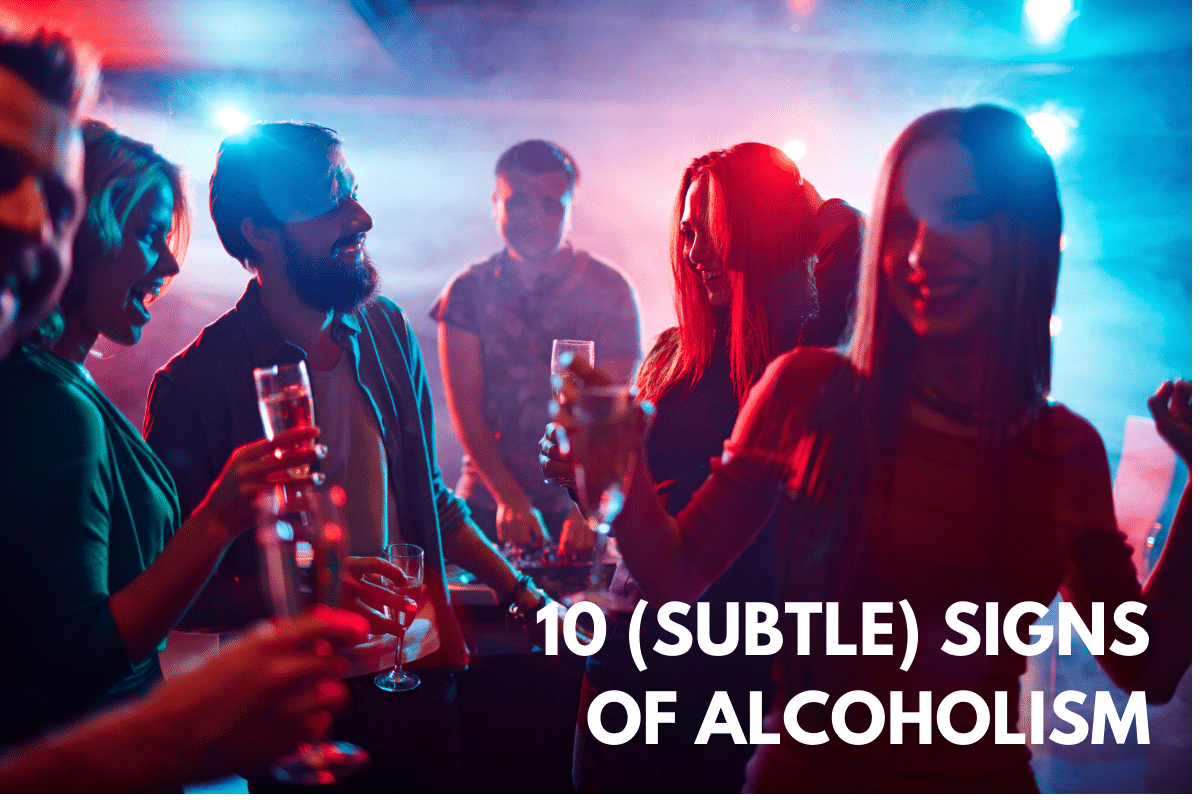Many of us take for granted just how prevalent alcohol is in our lives; we drink to celebrate, to mourn, to relax, to liven things up. And when drinking is such a firmly established social norm it can be difficult to tell when our bottle of vino with dinner or cocktail at happy hour has gone from casual imbibement to addiction. Anyone who has dealt with a substance abuse disorder can tell you that the signs of alcoholism aren’t always as obvious. Depictions in movies and books are often dramatic with overtly self-destructive behavior that leaves their personal, professional, and social life in shambles. But in real life, the signs can be much more subtle and masked by high functioning alcoholism. If you’re worried that you or someone you know may have a drinking problem, here are the 10 subtle signs of an alcoholic that you should look out for:
10 (Subtle) Signs of An Alcoholic
1. You habitually blackout whenever you drink
A wedding, ball game, night out with friends. It doesn’t matter what the occasion may be (if there’s any at all). When you drink, you tend to do so in excess and it often results in a blackout. You may try to set limits for yourself or swear that you won’t be drinking at all, but when drinks are poured, you struggle with controlling yourself.
2. You turn to drinking whenever you’re stressed
It’s not unheard of for people to have a drink to unwind after a rough day, but when it gets to the point that you need a drink in order to cope, you’ve likely crossed into addiction territory. Using alcohol as an emotional crutch can be attributed to a physical dependence on alcohol to provide your body with dopamine.
3. Your tolerance has gone way up
It takes a lot to get you drunk, far more than it used to, or you find it difficult to achieve a buzz at all anymore. This is a tell-tale sign of physical dependence and that your body is accustomed to the presence of alcohol. Reaching this point is dangerous. Even though you may not feel the mind-altering effects that you’re used to, your organs are working overtime and can quickly incur permanent damage.
4. Rationalizing your drinking habits (especially the ones at weird times)
It’s 8 AM – but your mug isn’t filled with coffee. Constantly drinking at odd hours (and making up reasons why you need to do so) is another warning sign that you may have slipped into addiction territory. Rather than waiting for occasions that would normally allow for drinking, you’re now actively seeking ways to justify having alcohol at odd or inappropriate moments.
5. You get defensive when people bring up your drinking habits
It’s likely that your friends and family will notice signs you’re an alcoholic before you do. And if the amount or frequency with which you drink is enough to be a cause of concern, you likely have a problem. But if your initial reaction is to immediately deny or rationalize your drinking habits without being willing to cut back, it could be a sign that you have developed a psychological addiction to drinking as well.
6. Drinking by yourself more often
Partaking in alcoholic beverages is usually a social affair – watching a sports game with friends, celebrating a promotion, having a nice dinner. That’s not to say that indulging on your own is inherently a sign of alcoholism. However, doing so frequently is one of the most self-identifiable indications that you are no longer in the realm of casual drinking. Drinking by yourself could mean that you derive more pleasure from drinking itself rather than the social context surrounding it. It could also be that you are aware that your drinking habit is more excessive than what’s considered socially acceptable and don’t want your drinking habits to be seen by others.
7. You have a hard time remembering things
Long-term binge drinking can damage the brain’s frontal lobe. This can result in permanent cognitive impairment and memory loss (referred to as alcohol-induced amnesia) that makes it difficult to operate in everyday activities.
8. Skipping meals and opting for drinks instead
Forgoing proper meals in lieu of drinking is problematic for several reasons. Skipping meals to opt for an alcoholic drink deprives your body of vital nutrients what is bad for your overall health. But more worrisome is that it’s a clear sign that your priorities are out of whack. Together, the combined effects can transform into an eating disorder which can also a be warning sign of substance abuse. This type of behavior is quite commonplace and anemia and malnutrition are two conditions that often coincide with alcohol addiction.
9. Claiming that you need alcohol to do a task
Claiming that alcohol is needed to carry out some sort of function (i.e. sleeping, working, socializing, staying calm) is a red flag and can be an indication of high-functioning alcoholism. Alcoholics have a tendency to misattribute alcohol as enhancing their ability to perform the task or activity is at hand (i.e. “It helps me sleep better”, “It makes me friendlier”). This ‘need’ can be physical or psychological but clearly demonstrates that alcohol has now become deeply integrated into someone’s day-to-day life. The far more likely reality is that the individual has gotten to a stage where they use alcohol to keep withdrawal effects at bay which if allowed to happen, comparatively make them feel and perform worse than without it.
10. Frequent diarrhea or stomach pain
The damage that alcohol wreaks on the liver and kidneys is well-known, but a less obvious connection is that of excessive drinking and the digestive system. Heavy drinking damages the tissues in your intestines which prevents them from properly digesting food. This means the body is far less efficient at drawing vitamins and other essential nutrients from the food you eat (another cause of malnutrition in alcoholics). The other consequence of a disrupted digestive system is GI distress such as gassiness, bloating, and diarrhea.
See the Signs: You Might Be An Alcoholic
The first step in getting help for alcohol abuse (or any other type of substance abuse for that matter) is recognizing the addiction in the first place. The next is doing something about it. If you are struggling to overcome your alcohol addiction contact the Freedom Center today. Our experienced staff can help you regain control over your life. We are available 24/7 to find the best course of treatment for you.

































